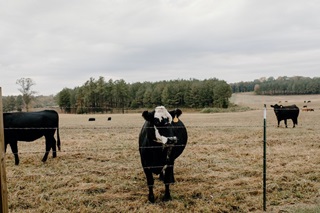Calor Ireland's Research on Renewable Energy Adoption in Rural Businesses


The research found 46% of those surveyed are experiencing ‘a lot of pressure’ to become more sustainable while a further 53% said they are experiencing at least some pressure to do so.
The research, conducted on behalf of Calor Ireland by Censuswide, surveyed energy decision makers in the manufacturing and production industry operating in rural areas outside of Dublin and off the natural gas grid. The focus was on current sustainability pressures and their plans around renewable energy adoption.
It showed that in addition to experiencing pressure to be more sustainable, respondents were also applying pressure to businesses in their supply chain.
A total of 39% of respondents said that they ‘only use’ suppliers with renewable or sustainable business activities and a further 56% said they use some suppliers who fit into this category.
The findings highlight the growing need for businesses to demonstrate their commitment to sustainability to remain competitive.
Just over 3 in 5, (61%) of businesses surveyed said they are using renewable or green energy in their business operations, with just over a third (34%) stating they do not do so.
When it comes to switching or upgrading to lower carbon and renewable energy sources, the survey shows businesses are slower to implement a full retrofit.
Only 7% of businesses are using heat-pumps as the main source of energy supply and 5% are using solar panels.
The main source of energy used by the businesses surveyed are electricity (33%), followed by LPG (20%), oil (15%) and natural gas (11%). This shows that a large percentage of businesses are continuing to use higher carbon emitting fuels, such as oil. For many manufacturing businesses, switching to natural gas is not an option for off grid manufacturing, emphasising the need to greater lower carbon alternative such as LPG.
When asked what, if anything, they had done to reduce carbon emissions in their businesses, 53% of respondents said they had upgraded lighting, while 39% had switched to using HVO for transport, a renewable biofuel and drop-in replacement for diesel that can reduce carbon emissions.
A total of 38% said they had switched to a lower carbon or renewable energy source, 30% cited a reduction in overall energy consumption and 26% said they had installed solar panels.
While pressure is mounting on businesses to show their commitment to adopting more environmentally friendly initiatives, many businesses are experiencing barriers to switching to lower carbon and renewable energy sources. A total of 52% of the manufacturing and production companies surveyed said cost restraints were the greatest barrier to switching.
This is perhaps a sign of the impact on businesses of increased input costs, higher wage demands, inflationary pressures. As it becomes increasingly evident that comprehensive retrofits are proving to be costly, there is a growing need for affordable transition solutions.
And with growing business overheads, 25% of surveyed businesses said that switching energy sources isn’t a priority due to other pinch-points.
Asked, when, if ever, they expected to move to a lower carbon or renewable energy source, 20% of those who have yet to do so said they would do so in the next year and 46% said in the next five years. Nearly one in four (24%) said they would do so when it becomes available for their business type and 10% said when government regulations required them to take such action.
Despite the persistent challenges posed by climate action goals and input costs, 60% of those surveyed believe the government is providing appropriate support for businesses transitioning to lower carbon or renewable energy. A total of 23% consider the support excessive while 17% deem it inadequate.
Commenting on the survey findings, Oliver Kenny, Chief Commercial Officer, said:
For almost 90-years, Calor has ensured that homes and businesses across Ireland, and particularly rural Ireland, have had access to reliable, lower carbon energy and renewable gas. Calor’s purpose is to drive Ireland's energy transition and create a sustainable future for generations to come. With the launch of a certified renewable liquid gas (BioLPG) in 2018, Calor demonstrated its commitment to playing an active role in Ireland’s transition to a decarbonised economy.
Calor is now actively investing in lower carbon and renewable alternatives to provide viable options for homes and businesses in rural Ireland. Calor’s responsible product strategy looks to ensure that the source and supply of its products becomes increasingly renewable and sustainable. This ambition underscores Calor's ongoing efforts to promote sustainability and reduce carbon emissions while continuing to meet the energy needs of its customers across the country.
To find out more about our tailored solutions visit our website or to request a call back to discuss your energy options contact us directly.